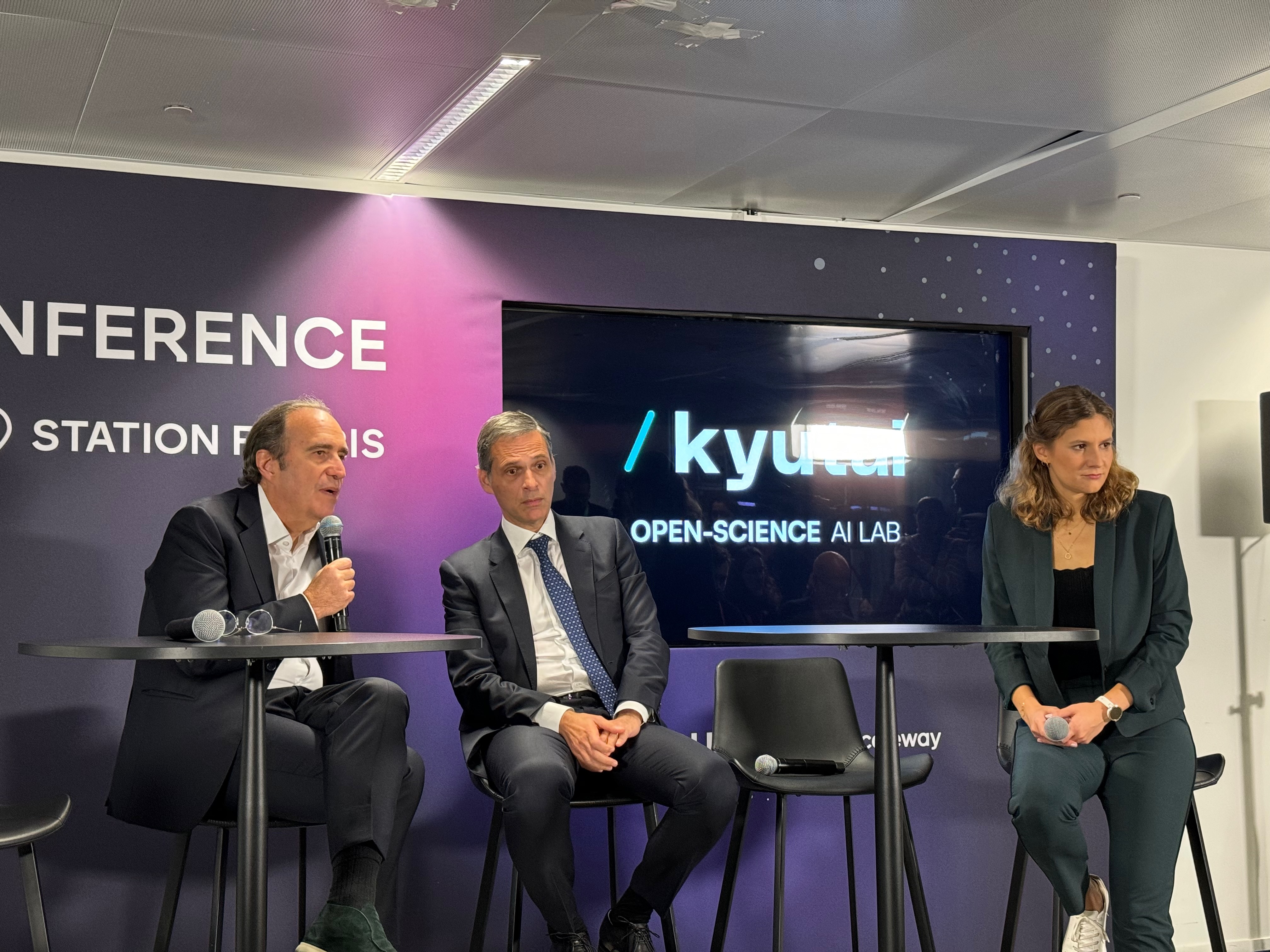This morning at Scaleway’s ai-PULSE conference, French billionaire and Iliad CEO Xavier Niel gave some extra details about his plans for an AI research lab based in Paris.
This new lab called Kyutai will be a privately-funded nonprofit working on artificial general intelligence. It will work with PhD students, postdocs and researchers on research papers and open-source projects. When Iliad originally unveiled this research lab, the firm said that Niel was committing €100 million to this project ($109 million at today’s exchange rate).
“Thanks to some amazing friends who are there today, now we are close to €300 million for the financing of this initiative,” Xavier Niel said at the conference. Among those “friends” is another French billionaire, Rodolphe Saadé, the CEO of French shipping and logistics giant CMA CGM, who is putting €100 million too. There are other smaller contributors, such as Eric Schmidt’s foundation and some unnamed donators.
This is just a starting point as Kyutai is open to more donations. “What’s interesting with so many journalists in the room is that the project will potentially interest other investors,” Saadé said at a press conference after the announcement.
As Kyutai will work on foundational models, they will also need some compute power. The good news is that Scaleway, the cloud division of Iliad, recently acquired a thousand Nvidia H100 GPUs. These top-of-the-line GPUs are essential for inference and model training and will be available at cost for Kyutai.
Kyutai has already started hiring for its core scientific team. Six men took the stage this morning to talk about their previous work and what they have in mind for the research lab — Patrick Perez, Edouard Grave, Hervé Jegou, Laurent Mazaré, Neil Zeghidour and Alexandre Defossez. They previously worked for Meta’s AI research team FAIR, Google’s DeepMind division, Inria, etc.
Patrick Perez, who previously worked for Valeo, is going to be the director of the research lab. Kyutai has also put together a team of scientific advisors who are well-known AI researchers — Yein Choi, Yann LeCun and Bernhard Schölkopf. They will just check everyone’s work once or twice a year and give feedback.
One of the reasons why Kyutai thinks it can convince some researchers to join its lab is that researchers will be able to publish research papers.
“Unfortunately, big tech companies tolerate scientific publications less and less. Beyond the ego boost for researchers, it helps to advance research and contribute to the common good,” Niel said during the press conference.
Of course, this isn’t the first open AI research lab. OpenAI, as the name still indicates, started as a nonprofit. But things have changed drastically after Sam Altman started working full time on OpenAI in 2019. OpenAI moved to a more traditional corporate structure and raised funding from Microsoft.
Other companies have also been working on open-source foundational models, such as Meta with its Llama model and Mistral AI. Kyutai’s models will be open source too, but the researchers describe their work as open science. They plan to release open-source models, but also the training source code and data that explain how they released these models.
“When it comes to the timeline, I don’t think our aim is necessarily to go as fast as Mistral, because our ambition is to provide a scientific purpose, an understanding and a code base to explain the results,” Alexandre Defossez said at the press conference. But they expect to have something to share within a year.
Laurent Mazaré, another researcher from Kyutai’s team, still described Mistral AI’s first open-source model as a success because many community members have been fine-tuning it and exploring use cases based on the Mistral 7B model.
It’s also going to be interesting to see if a research lab is more efficient at releasing foundational models compared to private companies, and how private companies are going to leverage Kyutai’s work for commercial applications.
Image Credits: Romain Dillet / TechCrunch
“I’m also a strong believer in open source, and we need to turn it into a French asset,” French President Emmanuel Macron said in a pre-recorded video message at the conference.
France’s position: regulating use cases, not models
Macron also used this opportunity to define and defend France’s position on Europe’s AI Act, saying that use cases should be regulated, not model makers. France has been pushing to water down the AI Act in trilogues (a trilogue is a negotiation between Europe’s three main instances, the Parliament, the Commission and the Council).
“Regulation is not the enemy of innovation, quite the contrary. It’s not a question of defining good models, but we need to ensure that the services made available to our citizens are safe for them, for other economic players and for our democracy,” Macron said.
“With work on the European regulation for artificial intelligence currently in ‘trilogues’, regulation must be controlled and not punitive, to preserve innovation and regulate usage rather than technology as such,” he added.
Xavier Niel basically sided with France’s position on this topic during the press conference. According to him, Europe is lagging behind when it comes to AI innovation, and regulation will slow down European newcomers and diminish the chances of them catching up.
“For the time being we’re more in the innovation part than the regulation part. Creating regulation means it creates barriers to competitors,” Niel said.
Maybe if French AI companies become massively successful, things could change. “I’d love it if one day we could talk about French imperialism in AI,” Niel added later in the conversation.

Image Credits: Romain Dillet / TechCrunch
Source link









